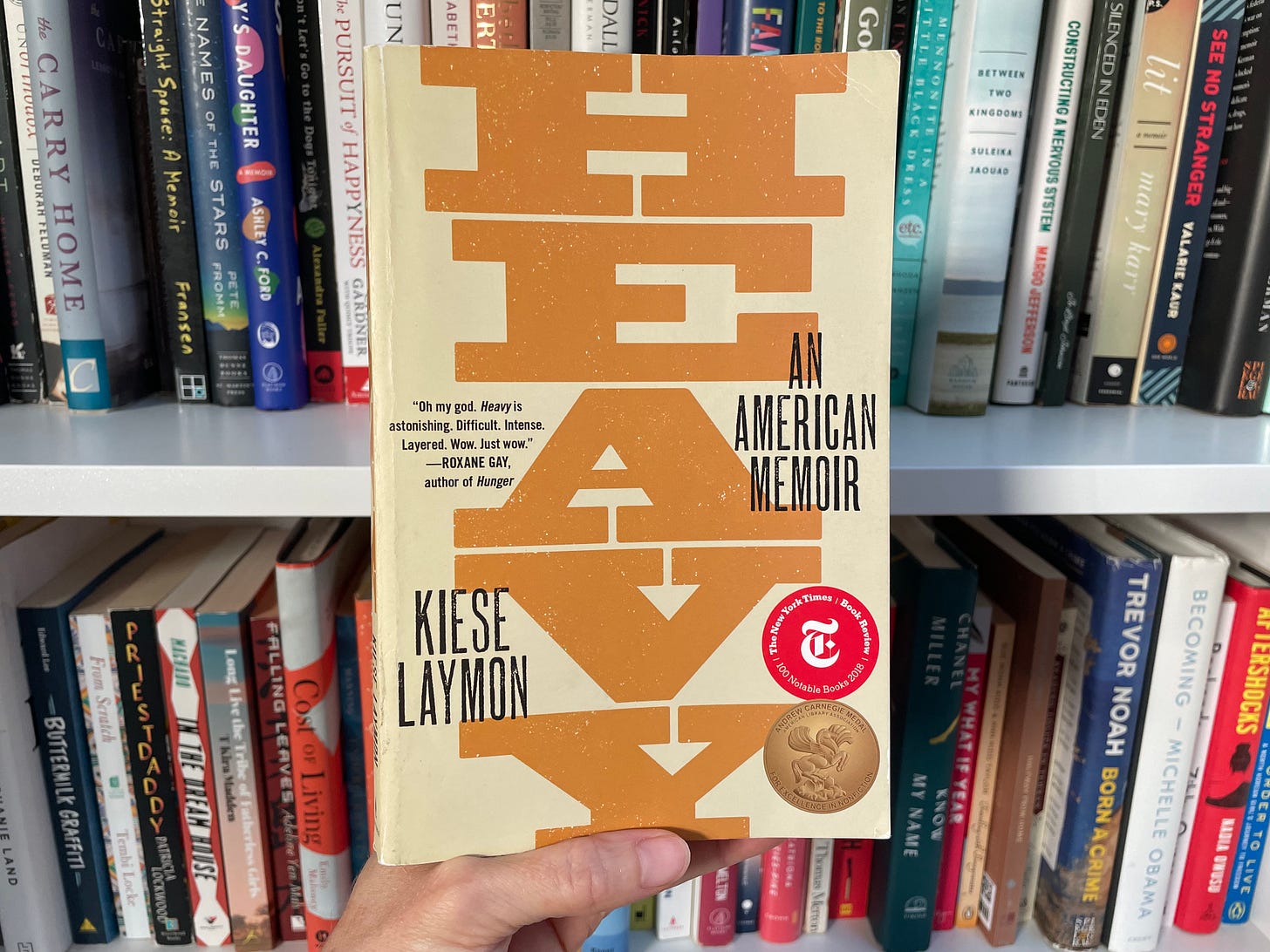Memoirs with Melissa shares bimonthly reviews intended to expose readers to diverse authors and life experiences. To see more of what I’m reading, browse my reading activity on The Story Graph.
When Kiese Laymon was a student at Millsaps College, he made it a point to read everything James Baldwin wrote. He imagined the famous author was writing to him, a Black boy raised by a single mother in Jackson, Mississippi.
Laymon was already a writer himself, and at one point in his life, he was desperate to be read by white people. Fortunately for his future readers, his reflections on Baldwin’s work helped him think bigger.
What if, Laymon wondered, Baldwin had written the entirety and not just the first section of The Fire Next Time to his nephew?1 How would the book have been different if Baldwin had written it for his niece? “Mostly, I wondered what black writers weren’t writing when we spent so much creative energy begging white folk to change,” writes Laymon in his own award-winning book, Heavy: An American Memoir.
“Mostly, I wondered what black writers weren’t writing when we spent so much creative energy begging white folk to change.” Kiese Laymon, Heavy: An American Memoir
Laymon ended up writing his memoir to his mother. In a way, he’s always been writing for his mother, a political scientist working on her PhD who assigns him essays to write throughout his childhood. Though Laymon did not set out to write this memoir for me, a white woman, I found his story so poignant, I couldn’t look away.
The second person point of view renders his prose intense, authentic, and provocative. In Heavy, Laymon becomes his own editor, confronting the secrets and truths of his family, his body, and society. His childhood is riddled with the dualities of life: addiction and genuine love, abuse and sexual discovery, private school and poverty, and what he and a friend call Black Abundance. “We were mad, and sometimes sad, but we were other stuff, too,” he writes.
Laymon’s own body’s extremes ground his story in the physical dimension. As a 12-year-old kid, he’s already 218 pounds. Later, as an adjunct professor at Vassar College, he dips to 165.7 pounds, 153.3 pounds less than he weighed at his heaviest. How does he mediate these damaging extremes and meet his body, his life, and the world in its wholeness?
“We were mad, and sometimes sad, but we were other stuff, too.” Kiese Laymon, Heavy: An American Memoir
Throughout his story’s telling, Laymon seems to be working out the intersection of truths for himself and his mother. But in the process, he’s articulating the harsh realities many Americans would rather not hear or see in their entirety. There’s truly something for everyone here.
Though I’ve known for years about intersectionality—the interconnected nature of how oppression is experienced in social categories like race, class, and gender—Laymon’s depiction of a post-9/11 subway ride made the concept more tangible. After being thanked for speaking up in defense of a Muslim family being heckled on the train, he writes, “I wondered if this feeling I had was what ‘good white folk’ felt when we thanked them for not being as terrible as they could be.”
Though I’ve known for years about intersectionality—the interconnected nature of how oppression is experienced in social categories like race, class, and gender—Laymon’s depiction of a post-9/11 subway ride made the concept more tangible.
One of my favorite sections is Laymon coming into his identity as a Black feminist. “I knew men, regardless of race, had the power to abuse in ways women didn’t,” he writes. “I knew the power to abuse destroyed the interiors of men as much as it destroyed the interiors and exteriors of women.” He goes on to embrace his understanding of patriarchy, compulsory heterosexuality, and gender fluidity—all new lenses for seeing humanity.
What made Heavy such a revolutionary read for me was Laymon’s willingness to drill into his curiosities and ask difficult questions. Thank goodness he took his mother’s childhood advice when she said, “A good question anchored in real curiosity is much more important than a cliché or forced metaphor.”
I’ve heard so many wonderful things about this book. Now that I’ve read it, I couldn’t agree more.
All my reviews are public. I welcome and value every free subscriber. Paid subscriptions are an extra way to support my work in elevating the canon of human experience. Thank you!
The audio version of The Fire Next Time, by James Baldwin was free on Hoopla Libby with my library card.





Agreed. Heavy is a brilliant book, so many facets, such raw power.
Great perspective on an amazing memoir. Destined to be a classic.